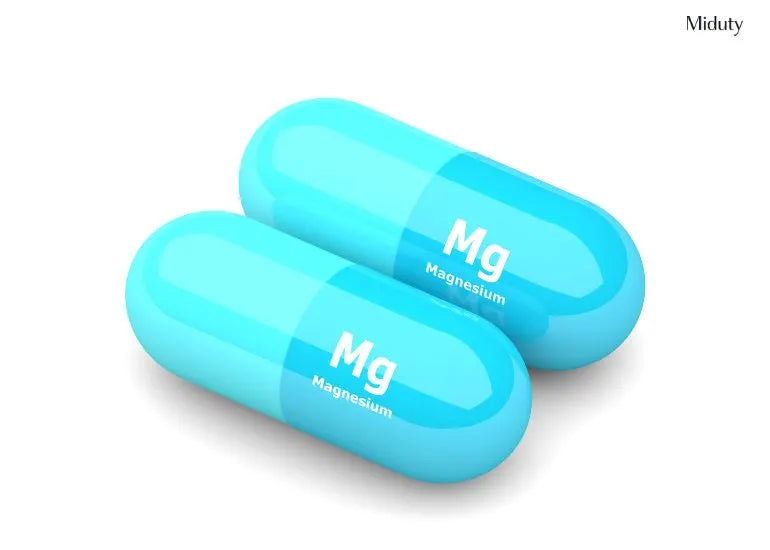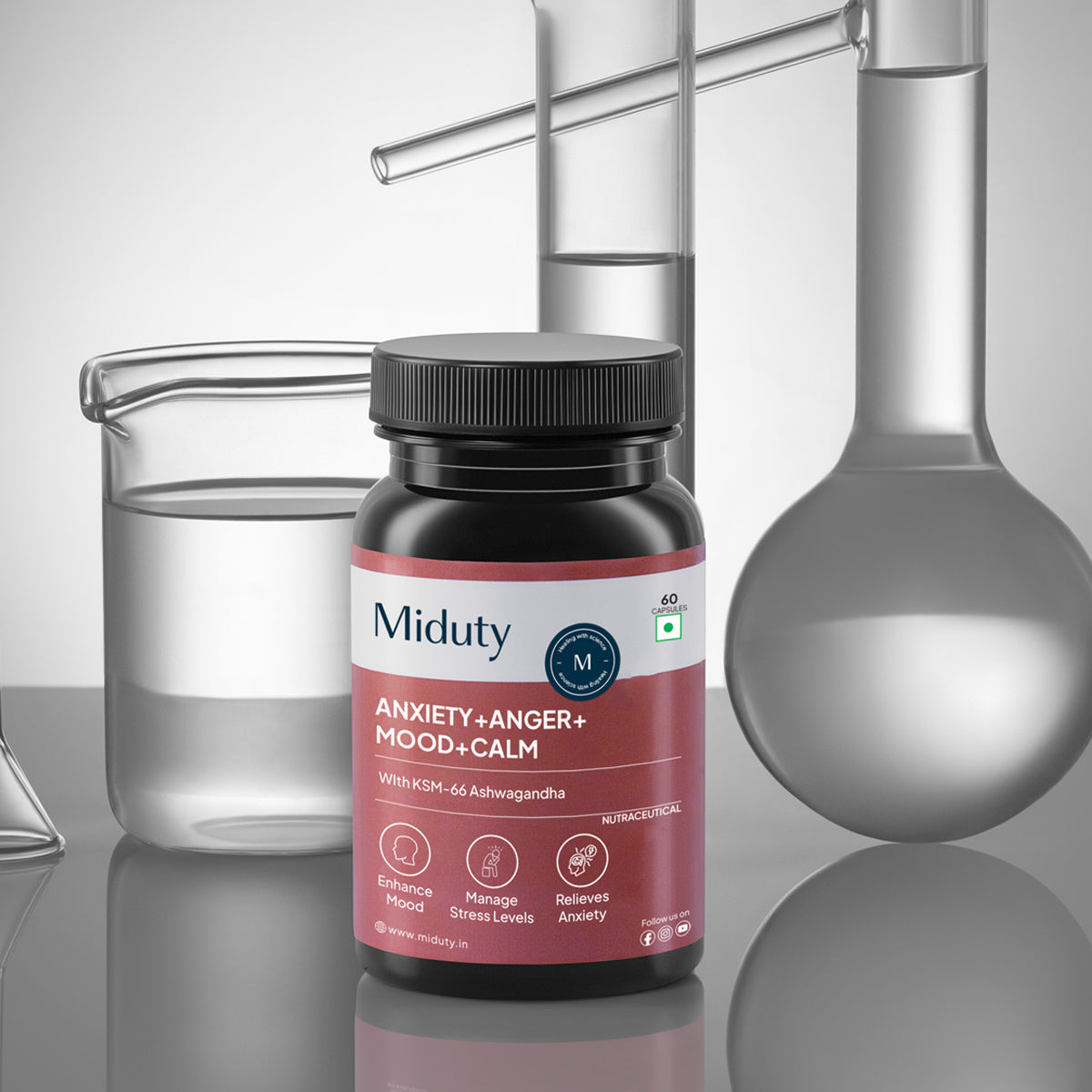
11 Warning Signs of Magnesium Deficiency You Must Know
You're eating fairly healthy, staying active, and doing your best to get enough rest — yet you still feel off. Maybe you're exhausted for no clear reason, your muscles cramp at night, or anxiety sneaks up on you more often than usual. If that sounds familiar, the problem might not be you, it might be magnesium.
Often called the "relaxation mineral," magnesium is involved in over 300 enzymatic reactions in the body. It helps regulate nerve and muscle function, supports heart health, stabilizes mood, and keeps your energy levels steady. Yet, despite its importance, magnesium deficiency is incredibly common, even among people who eat balanced diets.
Modern farming practices deplete minerals from soil, processed foods strip nutrients, and stress, caffeine, and certain medications can all lower magnesium levels. The result? Millions of people may be walking around mildly deficient without even realizing it.
Let's take a closer look at 10 warning signs of magnesium deficiency you might be missing and what you can do to restore balance naturally.
Key Takeaways
1. Your Body's Silent Signal: Muscle cramps, fatigue, or anxiety may not just be stress — they could be your body's way of saying you're low on magnesium.
2. Mind-Body Connection: Magnesium supports mood stability, relaxation, and better sleep by calming your nervous system and balancing neurotransmitters.
3. Eat Your Magnesium: Leafy greens, nuts, seeds, whole grains, and even dark chocolate are delicious, natural ways to boost magnesium levels.
4. Choose the Right Supplement: Magnesium bisglycinate is highly absorbable, gentle on the stomach, and great for improving sleep, mood, and muscle recovery.
5. Restore Your Balance: Spotting the subtle signs early and making small dietary or lifestyle changes can help you reclaim your energy, calm, and overall wellbeing.
11 Warning Signs of Magnesium Deficiency
1. Muscle Cramps and Twitching
That annoying eye twitch or sudden calf cramp during the night isn't just bad luck — it could be a cry for magnesium. This mineral plays a crucial role in muscle contraction and relaxation. When levels dip, your muscles can spasm uncontrollably.
If you experience frequent cramps, restless legs, or twitches, it's worth checking your magnesium intake. Athletes, in particular, lose magnesium through sweat, which can make deficiencies more noticeable after intense workouts. [1]
2. Constant Fatigue or Low Energy
Feeling tired all the time, even after sleeping well? Magnesium is required for producing ATP (adenosine triphosphate) — the body's main source of energy. Without enough magnesium, your cells can't effectively convert food into usable fuel.
That persistent fatigue, brain fog, or "afternoon crash" could be your body signaling that it's struggling to generate energy efficiently. [2]
3. Anxiety, Irritability, and Mood Swings
Magnesium has a calming effect on the nervous system — it helps regulate neurotransmitters like serotonin and GABA, which influence mood and stress response. Low magnesium levels are linked to anxiety, irritability, and even depression.
If you feel more on edge than usual or find yourself snapping easily, a magnesium imbalance might be part of the picture. Restoring optimal levels often helps people feel calmer and more emotionally balanced. [3]
4. Trouble Sleeping
Can't seem to unwind at night? Magnesium helps activate the parasympathetic nervous system — your body's "rest and digest" mode. It also supports melatonin production, the hormone that regulates your sleep-wake cycle.
Deficiency can lead to restless nights, frequent waking, or difficulty falling asleep. Many people report deeper, more restorative sleep once they start supplementing magnesium or eating more magnesium-rich foods. [4]
5. Headaches and Migraines
Frequent headaches or migraines may also point to low magnesium. Research suggests that magnesium helps relax blood vessels and prevent the constriction that often triggers migraine pain.
People who suffer from chronic headaches are frequently found to have lower magnesium levels than those who don't. Increasing your intake could reduce both the frequency and intensity of migraines over time. [5]
6. Irregular Heartbeat or Palpitations
Your heart is a muscle and like any other muscle, it depends on magnesium to contract properly. Deficiency can cause irregular heart rhythms (arrhythmias) or a sensation of fluttering in the chest.
In severe cases, low magnesium has even been linked to higher risk of heart disease and high blood pressure. If you've noticed your heart "skipping a beat," it's worth discussing magnesium status with your doctor.
7. Numbness and Tingling
Magnesium helps maintain healthy nerve function. When levels drop, you might experience numbness, tingling, or a "pins and needles" sensation, particularly in the hands, feet, or face.
While other conditions can cause these symptoms, magnesium deficiency should not be ruled out, especially if it coincides with other warning signs.
8. Muscle Weakness
A lack of magnesium can lead to low potassium levels, which contributes to muscle weakness or that heavy, fatigued feeling after mild exertion. Some people describe it as "losing strength for no reason."
This happens because magnesium is vital for maintaining the balance of electrolytes; calcium, sodium, and potassium in and out of muscle cells. Without it, muscle performance drops quickly.
9. Cravings for Chocolate
Ever crave dark chocolate when you're stressed? That's not random chocolate (especially dark varieties) is one of the richest natural sources of magnesium.
If your body is begging for chocolate more than usual, it might be trying to tell you it needs this essential mineral. Of course, moderation is key, but a small square of dark chocolate can genuinely be a healthy magnesium boost.
10. Poor Digestion and Constipation
Magnesium draws water into the intestines and helps relax the muscles in your digestive tract, making bowel movements easier. Low levels can lead to sluggish digestion or chronic constipation.
If you're dealing with irregularity, increasing magnesium intake can often help get things moving — naturally and gently.
11. Blood Sugar Swings and Diabetes Risk
If you often feel shaky, tired, or crave sugar after meals, your magnesium levels might be low. Magnesium plays a key role in how your body manages blood sugar and insulin. When levels drop, it becomes harder for your cells to use insulin effectively, which can lead to unstable blood sugar and even increase the risk of developing type 2 diabetes over time.
Adding more magnesium-rich foods or a supplement can help support healthy blood sugar levels and make your energy more stable throughout the day.
How to Increase Your Magnesium Naturally?
The good news? Magnesium deficiency is entirely reversible. With the right diet and lifestyle tweaks, you can restore balance and start feeling better fast.
1. Eat Magnesium-Rich Foods
Incorporate these foods into your daily meals:
- Leafy greens: Spinach, kale, Swiss chard
- Nuts and seeds: Almonds, pumpkin seeds, chia seeds
- Legumes: Black beans, lentils, chickpeas
- Whole grains: Quinoa, brown rice, oats
- Fruits: Avocado, banana, dried figs
- Dark chocolate: 70% cocoa or higher
Cooking tip: Magnesium is water-soluble, so steaming or sautéing veggies helps preserve more of it than boiling.
2. Reduce Depleting Factors
Magnesium loss can be accelerated by certain habits or conditions. To preserve your stores:
- Limit caffeine and alcohol intake
- Manage stress (meditation, deep breathing, or yoga help)
- Avoid excessive processed foods
- Check with your doctor if medications like diuretics or proton-pump inhibitors (PPIs) might be lowering your magnesium
Supplement to Overcome Magnesium Deficiency
Even with a great diet, some people struggle to get enough magnesium — especially if they have digestive issues, high stress, or intense exercise routines. In such cases, magnesium supplements can be a practical solution. There are several forms of magnesium on the market — oxide, citrate, chloride, and glycinate, to name a few — but magnesium bisglycinate (also called magnesium glycinate) is widely regarded as one of the most effective and gentle options.
Here's why:
- High Absorption: Magnesium bisglycinate is bound to the amino acid glycine, which enhances absorption and makes it easier on the stomach.
- Gentle on Digestion: Unlike magnesium oxide or citrate, it doesn't cause diarrhea or stomach upset, making it suitable for daily use.
- Promotes Relaxation and Sleep: Glycine has calming properties that complement magnesium's natural ability to soothe the nervous system.
- Ideal for Stress and Sleep Support: Many people notice improved sleep quality, reduced muscle tension, and better mood after regular use.
- Suggested use: Always follow the dosage on the supplement label or your healthcare provider's advice. Most adults need around 300–400 mg of magnesium daily, though individual needs can vary.
Final Thoughts
Magnesium deficiency often whispers before it screams. It starts with subtle signs — a twitch here, a sleepless night there, that are easy to brush off as "normal stress." But those little clues are your body's way of saying it needs more support.
By paying attention to these warning signs and making mindful changes — eating whole foods, managing stress, and supplementing when needed, you can restore balance, boost your energy, and reclaim your calm.
Your body thrives on magnesium. Give it the attention it deserves, and it will thank you with stronger muscles, steadier moods, and deeper sleep.
FAQ's on Magnesium Deficiency Symptoms -
Q1 - How do you tell if your magnesium levels are low?
You can often spot low magnesium levels by paying attention to certain symptoms. Common signs include muscle cramps, constant fatigue, irregular heartbeat, and tingling or numbness in your hands and feet. Some people may also experience nausea, loss of appetite, or mood changes like irritability. However, the only reliable way to confirm a magnesium deficiency is through a blood test.
Q2 - Can magnesium cause diarrhea?
Yes, magnesium can sometimes cause diarrhea, particularly when taken in high doses or in forms like magnesium citrate or oxide. These types can draw extra water into the intestines, which may lead to loose stools, stomach cramps, or nausea.
Q3 - How can I raise my magnesium level quickly?
To get enough magnesium in your diet, aim to include a variety of nutrient-rich foods throughout the day. Try to eat at least five servings of fruits and vegetables daily, as they are excellent natural sources of magnesium. Include a minimum of three servings of whole grains, such as brown rice, oats, or quinoa, to help meet your body's needs. Add about one ounce, or a quarter cup, of nuts or seeds each day for an extra boost. It's also beneficial to include a serving of legumes, such as lentils, chickpeas, or beans, on most days of the week to maintain healthy magnesium levels.
Q4 - How do you feel when your magnesium is low in your body?
When your body's magnesium levels are low, you may feel muscle cramps, fatigue, and trouble sleeping. Other common symptoms include headaches, anxiety, tingling or numbness in the hands and feet, and even a reduced appetite.
Q5 - What organ is most affected by magnesium?
The kidneys are the organs most influenced by magnesium because they play a key role in controlling the body's magnesium balance. They regulate how much magnesium is excreted, helping to remove any excess and maintain healthy levels. While other organs such as the small and large intestines assist with absorption and the bones act as storage sites, the kidneys are vital for keeping magnesium levels stable and preventing a buildup that could lead to toxicity.
References













